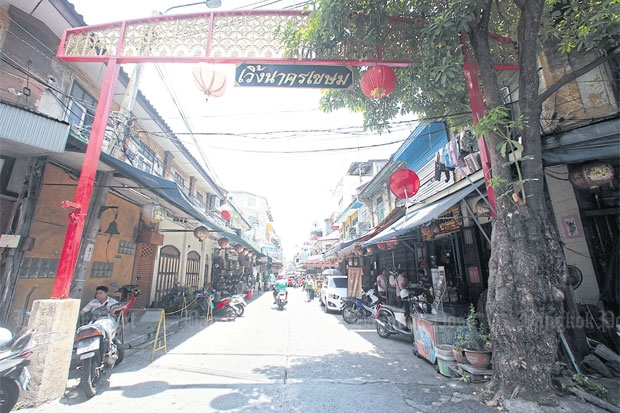
When Thira Techayuenyong’s father sent for him more than 70 years ago, the eight year old had no doubts about taking the one-way ticket out of his home town of Shantou in China. He packed his bags, took a good look around for the last time and said goodbye to his birthplace before heading out the door.
The little boy boarded a boat filled with at least 200 other Chinese people that day, including his brother, sister and aunt. The passengers were all hoping to find a better life in the same destination: Bangkok.
Mr Thira’s father had already gone ahead to set up home in a colonial-style shophouse on Charoen Krung Road, on the site of the second-hand market Verng Nakorn Kasem.
From a young age, Mr Thira worked in his father’s shop, stocking all manner of second-hand goods, from musical instruments to kitchenware and antiques. As time went by, they began selling more and more instruments. In the 1960s, Mr Thira saw an opportunity and began supplying Western musical instruments to meet rising demand from American GIs brought to Bangkok by the Vietnam War. The city was the most popular R&R destination among young soldiers, and new bars sprang up to cater to them, filled with girls and playing rock ‘n’ roll.
Mr Thira grew the family business into one of the biggest music stores in Chinatown, turning the locality into the country’s main hub for instrument shops.
But now, at the age of 80, Mr Thira is living in limbo. He’s spent the past two years wondering when land developers are going to move in and demolish his community, to be replaced by modern retail units, and yet another mall.
RICH TRADITION
A successful business owner of Mr Thira’s age doesn’t need to work any more, since his family has everything covered, but he refuses to retire. He’s not as quick on his feet as he used to be, but his mind is still sharp and his memory is clear.
Every day, Mr Thira walks slowly across the small street from the shophouse where he lives upstairs with his family to his main store: Theera Music Company. Without speaking, he walks around, surveying the different sections of the store.
He grabs one of the violins from a shelf and holds it out.
“This was the first musical instrument I learned to play,” he said proudly, before sitting down and thinking back to how his life began in the new country.
“We used to sell everything and anything we could,” Mr Thira explained. “From large items like second-hand chairs, closets, record players and bicycles to small bits and bobs like pots, lamps, aluminium trays and more.”
From time to time, Mr Thira’s father would acquire musical instruments; saxophones, trumpets or clarinets. Gradually, more people started coming in to ask for instruments, so Mr Thira thought it would be good to build on that side of the business.
As a young man with a mind for business — and before the shop’s Western clientele came — Mr Thira convinced his father there was a large market for traditional Thai instruments, particularly from schools and the palace.
The second floor of his shophouse was turned into a small factory, where Mr Thira employed local makers of drums and string instruments, the saw u and saw duang.
He also continued to buy second hand goods to sell at the shop, since so many people liked to shop for antiques and unique items in the area.
SHIFTING TRENDS
Verng Nakorn Kasem has always had a reputation for being the place to buy everything under the sun. Also known as the Thieves’ Market, it was once said to be stocked with goods that slaves stole from their masters after the abolition of slavery. The freed slaves sold the goods to Chinese traders, in exchange for money to start a new life.
As Mr Thira was growing up, he witnessed shifting trends at the market. When he was very young, most of the buyers were interested in second-hand goods for their homes, but the musical instrument market gradually increased.

PAUSE FOR REFLECTION: Thira Techayuenyong looks out from his shop at Verng Nakorn Kasem.
The community in Charoen Krung grew bigger, and so did the customer base. There was a phase when marching bands became wildly popular in the 1940s. The bands were often hired to play at ordination ceremonies or weddings, so the shop responded by selling the relevant instruments.
The demand for traditional Thai instruments dropped over time, so Mr Thira stopped making the products at the shop and focused on meeting market needs. Besides the marching bands, schools also started asking for Western musical instruments.
With limited connections, Mr Thira enlisted the help of a friend who worked for a well-established Western music store in the Klong San area. His friend could read and write English, and taught him how to buy instruments from abroad, placing his first order from a distributor in France.
The first instrument he imported from France was a clarinet. On its arrival, Mr Thira’s shop became the first in the area to stock an instrument from another country. His reputation grew and the orders rolled in.
Mr Thira decided to go to college and study English so he’d be able to liaise with foreign suppliers himself.
His biggest sellers were brass and woodwind instruments in response to the demand from marching bands, army bands and the many schools in the area.
HERE COME THE TROOPS
During the Vietnam War, US military officers were stationed across the country, while Bangkok became the top destination in the region for soldiers on R&R.
Mr Thira’s shop already had built a strong reputation, which helped draw his new group of customers: the American GIs.
The GIs brought their music with them, and rock ‘n’ roll was the order of the day.
“Lots of GIs would come into my shop and ask for guitars, which I didn’t have at the time,” Mr Thira said.
Seeing an opportunity, Mr Thira contacted his friend at the Klong San music store and asked to see a catalogue for guitars. He found a company in Germany that carried the new instrument his customers wanted: electric guitars. He became the first company to import an electric guitar for sale in Thailand.
Mr Thira still remembers how he felt when he first laid his eyes on it. He said it was a sexy instrument. He sold it to a GI and immediately put in an order for more.
To increase the choice he could offer customers, Mr Thira started to look for suppliers outside of Europe and found cheaper but just as good quality options in Japan. He wasted no time and signed up to a Japanese language school to study Japanese.
While US soldiers made up a large part of his customer base, the Thai military also began using his services. He once got a large order from a military unit wanting to equip their entire marching band.
The size of the order meant the supplier in the UK was unable to ship to Thailand. Mr Thira decided to make the trip all the way to England and carry back 500kg of instruments with him on the plane.
NEW DEVELOPMENT
Verng Nakorn Kasem is an area of lowrise shophouses and stalls situated on more than 14 rai of land on Charoen Krung Road. The land was originally owned by King Chulalongkorn. In 1898, the king gave the land to Marshal-Admiral Paribatra Sukhumbhand, one of his sons, and the land has been passed down through his family since.
While Verng Nakorn Kasem, or simply “Verng” to locals, has long been the place to buy instruments, there are also many stores that sell hardware, household appliances and industrial catering products. Many food vendors go there to buy the equipment they need to do their jobs. Between the shops in the area and private residences, Verng Nakorn Kasem is home to about 100 households.
In September 2012, the TCC Land Company, which is known for running the successful Asiatique market, announced they would invest more than 50 billion baht in buying Verng Nakorn Kasem to develop a new community mall, car park and retail units.
Scared they would be evicted, locals went to the bank and asked for a mortgage to buy the land they have lived on for five generations. The whole community could only raise 35 billion baht, not enough to rival the other bidder.
However, the company called in the locals for mediation and made eight promises in writing, including a pledge that any development would retain the character and identity of the community. They also said everyone would be able to continue renting retail space on the same spot.
Despite this, in April 2014, the company issued an eviction order to those living in the fresh market area, known as Zone 1. As part of the developments, they will demolish the area and build a large building for a car park.
The owner of Yong Seng music store, Chatchawal Asavasopon, killed himself by jumping into the Chao Phraya River near Klong San in May 2014. The family told the media that Chatchawal was stressed by the eviction order, as well as personal health issues.
The company then called in the remaining locals to inform them they would raise the monthly rent by 75% once the first phase of development is complete. They later changed their mind and said the price would in fact go up by 100%.
By January last year, the rest of the residents had received eviction orders, effective by the end of 2016. Locals are now fighting in court to force TCC Land Company to honour its eight promises.
UNKNOWN FUTURE
Mr Thira looks out from the main entrance of his shop. His face is emotionless but his eyes are filled with sorrow. He is obviously worried about what lies ahead. “It will be sad if we have to move. My whole life is here,” Mr Thira said.
Part of the third generation to live in the area, Mr Thira’s daughter Pattamporn Techayuenyong has carried on the family business despite wanting to pursue other interests when she was younger. Now in her forties, she threw herself into the music industry when she realised how important it was to keep the family’s legacy alive.
Ms Pattamporn is one of the many people fighting for the right of the community to stay where they are. She has contacted academics, the National Human Rights Commission, the Fine Arts Department and others who she thinks can protect them from development.
“This area is more than just the place where we make a living,” Ms Pattamporn explained. “It’s a historical place for our family, and it’s the only place we can find our roots.”
Theera Music Co currently rents 12 units in Verng Nakorn Kasem, from where they run their business and live. The family pays 20,000-30,000 baht per unit, up from 800 baht a month when Mr Thira first moved in.
“If we are lucky enough to be able to keep our business going, we will have to give up several of the units since we can’t afford them all. But we still want to keep the main building where my father started all this,” Ms Pattamporn said.
Though Theera Music has shops in two other locations, the original one in Verng Nakorn Kasem makes the most money and attracts the most customers.
TCC Land Company is yet to give the Techayuenyong family a clear message on when or if they will have to move. They hope to be able to stay at least until August this year. Many shops in the area are already moving out and clearance sales are under way.
The family has found an alternative location in the Pin Klao area, but it will not be the hub that Verng Nakorn Kasem is, so they are reluctant to move.
Mr Thira walks around his shop slowly and runs his hand over the musical instruments on the shelves.
He looks around, remembering the past, and his gaze turns to the window. He stares out in silence, realising life will never be the same again.

LIVING HISTORY: When those operating in the Verng Nakorn Kasem area first learned of plans to demolish the block for redevelopment, they collaborated to create a book commemorating their time in the area.
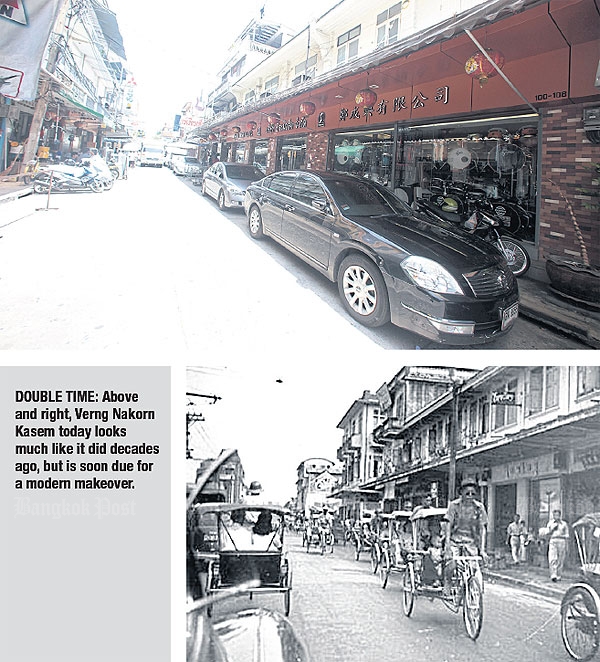
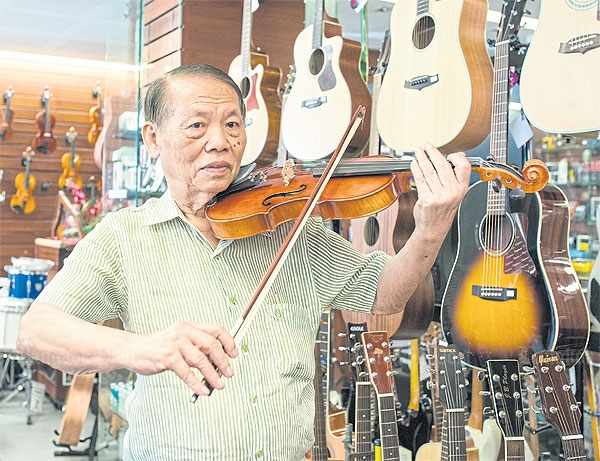
FIT AS A FIDDLE: At 80 years of age, Thira Techayuenyong remains as sharp as the day he first picked up a violin at his shop in Verng Nakorn Kasem around seven decades ago.
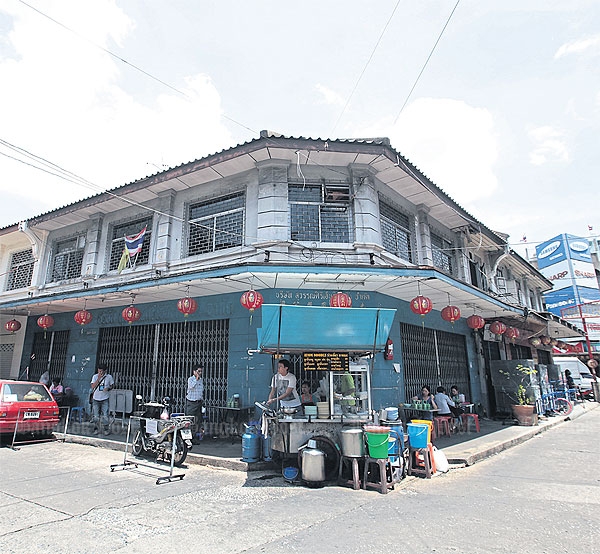
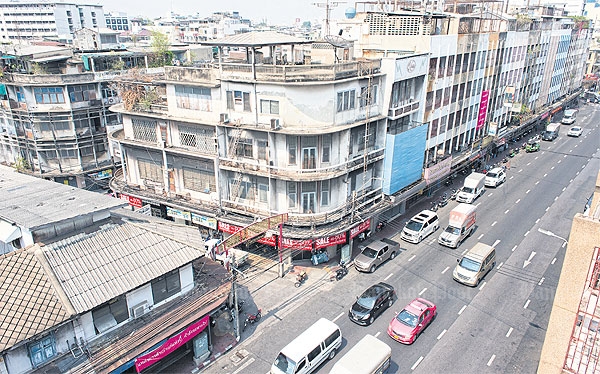
WHEN THE MUSIC’S OVER: Theera Music, along with many other businesses, is being forced to relocate from its location at Verng Nakorn Kasem, which is slated to be demolished to make way for a new development.
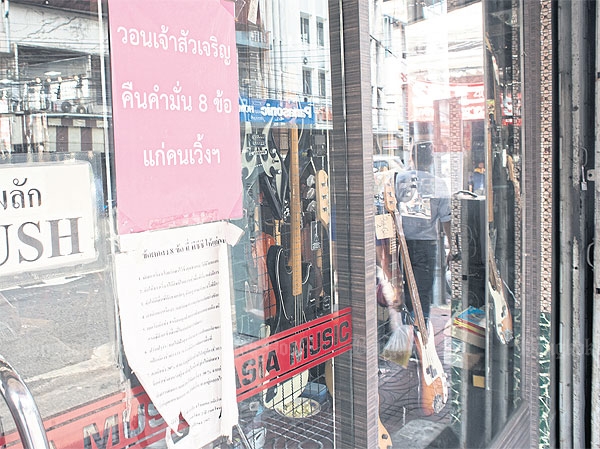
LAST POST: One of the many signs posted throughout Verng Nakorn Kasem calling for the property owner to deliver on its promises made to business owners when it purchased the land in 2012.
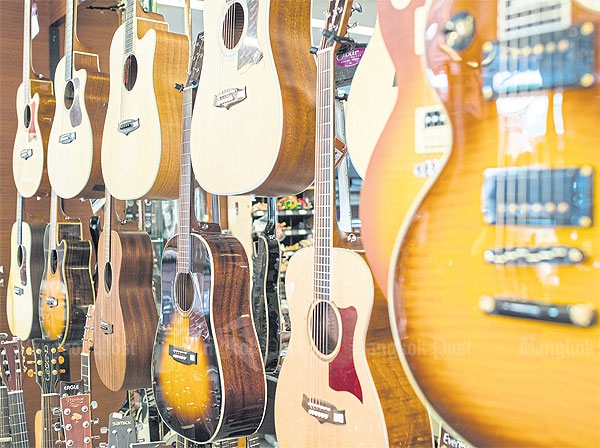
STRINGS ATTACHED: Over its 70 years of operation, Theera music has expanded its range of instruments from originally offering Thai made goods to importing musical instruments from overseas.
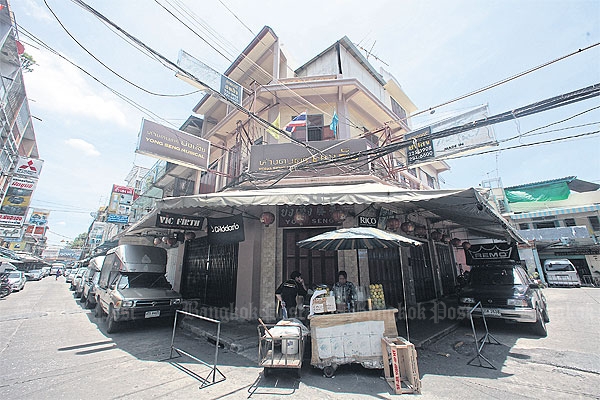
THICK AS THIEVES: Once known as the Thieves’ Market, Verng Nakorn Kasem is now most famous for its long-standing music and hardware stores.